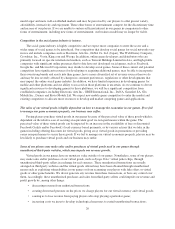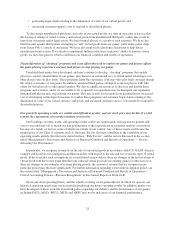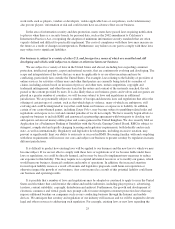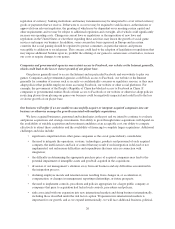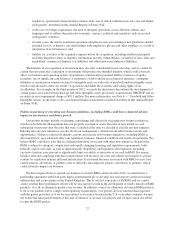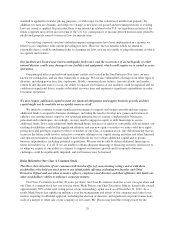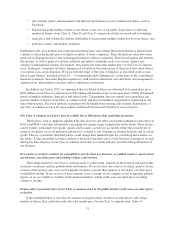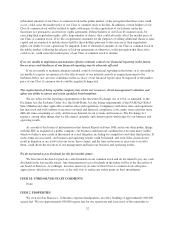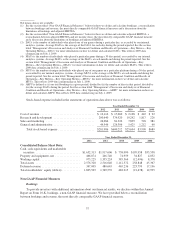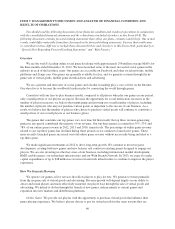Zynga 2012 Annual Report Download - page 38
Download and view the complete annual report
Please find page 38 of the 2012 Zynga annual report below. You can navigate through the pages in the report by either clicking on the pages listed below, or by using the keyword search tool below to find specific information within the annual report.foreseeable future, subject to additional issuances of stock by the company or sales by Mr. Pincus. This
concentrated voting control limits the ability of our other stockholders to influence corporate matters and could
adversely affect the market price of our Class A common stock.
Future transfers or sales by holders of Class B common stock or Class C common stock will result in those
shares converting to Class A common stock, which will have the effect, over time, of increasing the relative
voting power of those stockholders who retain their existing shares of Class B or Class C common stock. In
addition, as shares of Class B common stock are transferred or sold and converted to Class A common stock, the
sole holder of Class C common stock, Mark Pincus, will have greater relative voting control to the extent he
retains his existing shares of Class C common stock, and as a result he could in the future control a majority of
our total voting power. Mark Pincus is entitled to vote his shares in his own interests and may do so.
Certain provisions in our charter documents and under Delaware law could limit attempts by our stockholders
to replace or remove our board of directors or current management and limit the market price of our Class A
common stock.
Provisions in our certificate of incorporation and bylaws may have the effect of delaying or preventing changes
in our board of directors or management. Our certificate of incorporation and bylaws include provisions that:
• establish an advance notice procedure for stockholder proposals to be brought before an annual
meeting, including proposed nominations of persons for election to our board of directors;
• prohibit cumulative voting in the election of directors; and
• reflect three classes of common stock, as discussed above.
These provisions may frustrate or prevent any attempts by our stockholders to replace or remove our current
management by making it more difficult for stockholders to replace members of our board of directors, which is
responsible for appointing the members of our management. In addition, because we are incorporated in
Delaware, we are governed by the provisions of Section 203 of the Delaware General Corporation Law, which
generally prohibits a Delaware corporation from engaging in any of a broad range of business combinations with
any “interested” stockholder for a period of three years following the date on which the stockholder became an
“interested” stockholder.
Our share price has been and will likely continue to be volatile.
The trading price of our Class A common stock has been, and is likely to continue to be, highly volatile and
could be subject to wide fluctuations in response to various factors, some of which are beyond our control. Since
shares of our Class A common stock were sold in our initial public offering in December 2011 at a price of
$10.00 per share, through December 31, 2012, our stock price has ranged from $2.09 to $15.91. In addition to the
factors discussed in these “Risk Factors” and elsewhere in this Annual Report on Form 10-K, factors that may
cause volatility in our share price include:
• changes in projected operational and financial results;
• issuance of new or updated research or reports by securities analysts;
• market rumors or press reports;
• announcements related to our stock repurchase program;
• the use by investors or analysts of third-party data regarding our business that may not reflect our
actual performance;
• fluctuations in the valuation of companies perceived by investors to be comparable to us;
30


